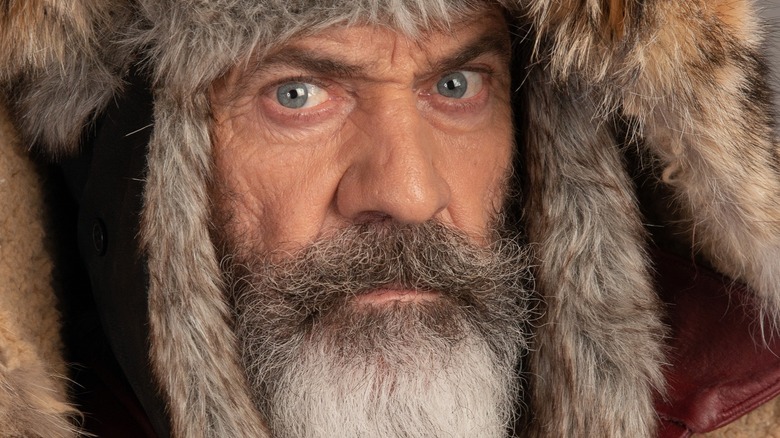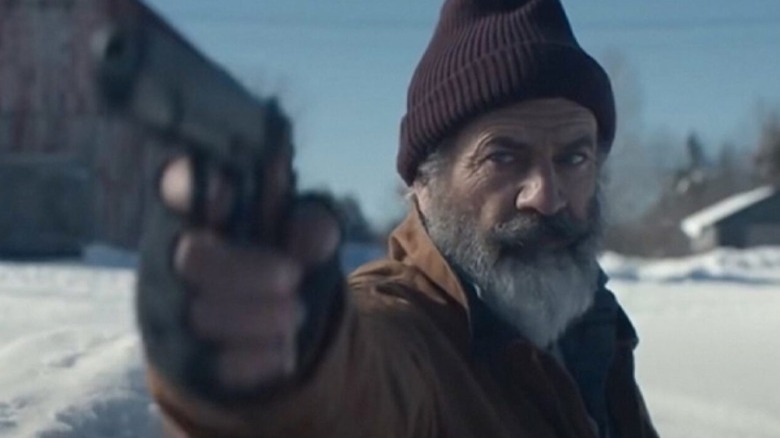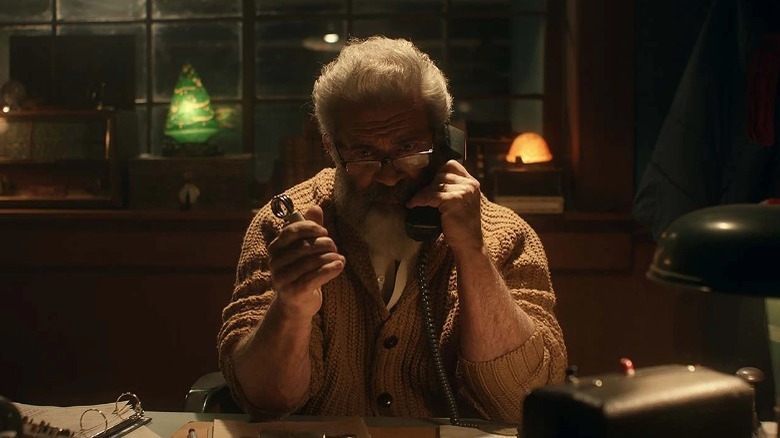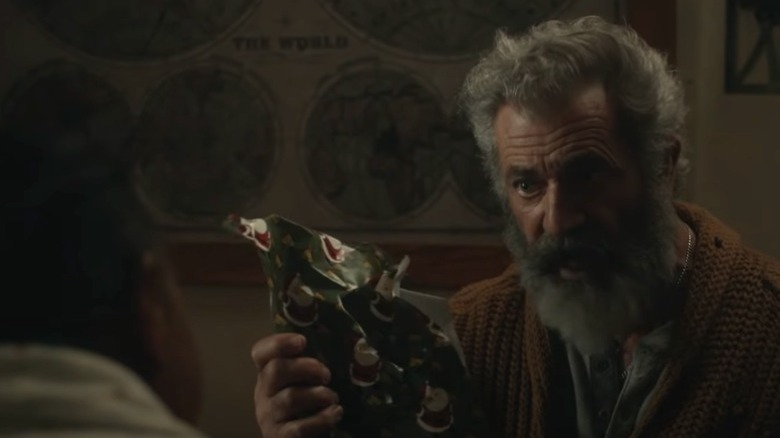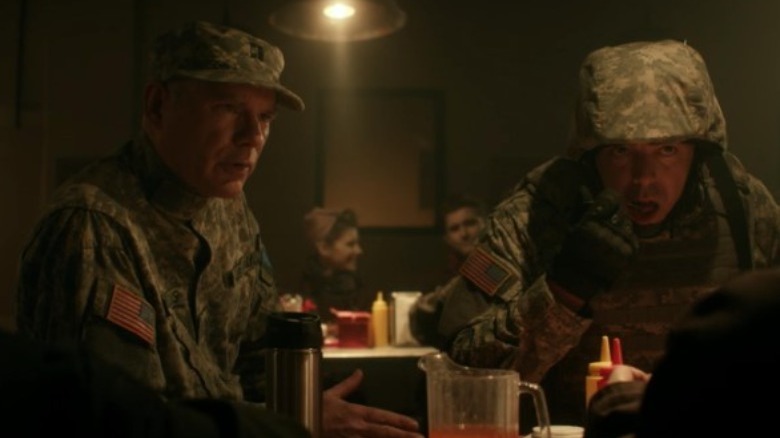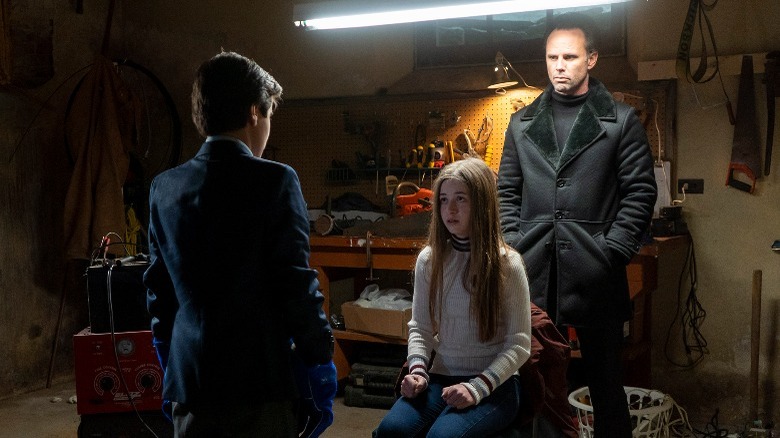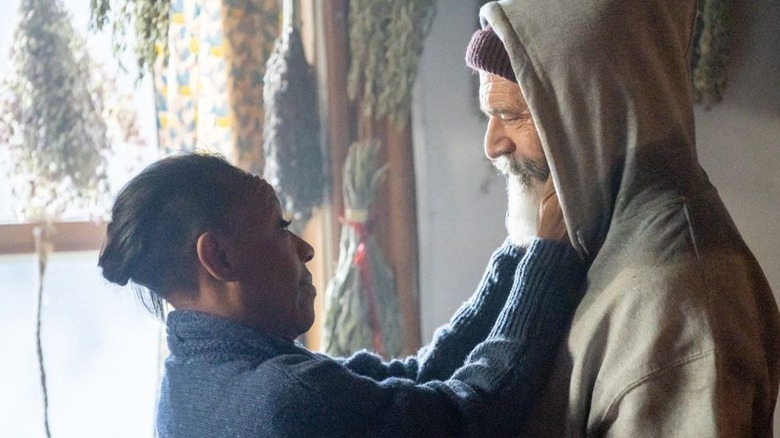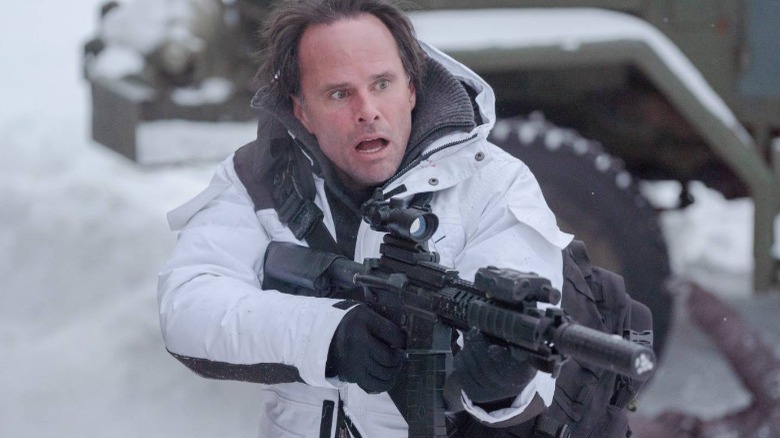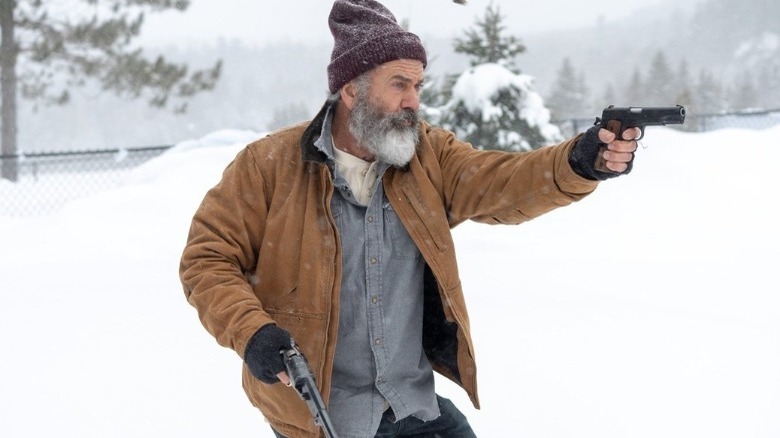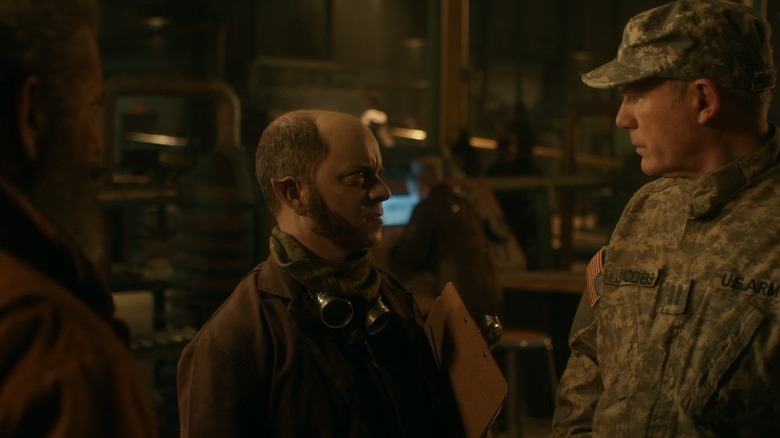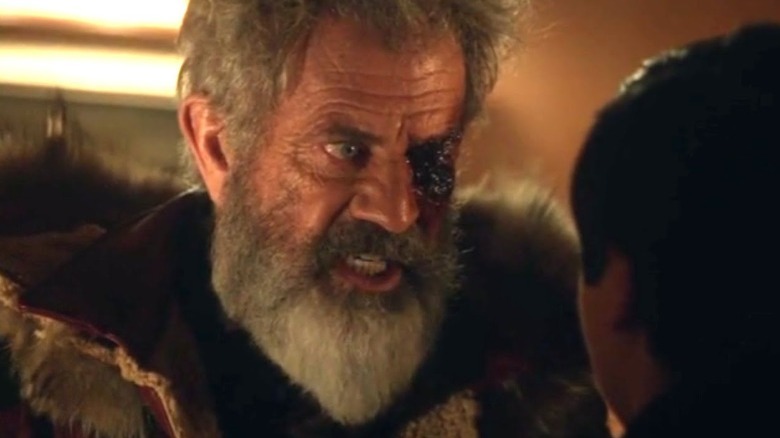The Ending Of Fatman Explained
"Fatman" is a post-Christmas tale of revenge being best-served ice cold. The story centers on little Billy Wenan (Chance Hurstfield), who is delivered a lump of coal for Christmas and vows revenge against the man who sent it to him. The neglected son of a wealthy businessman, Billy uses his family's connections and riches to hire his own personal contract killer (Walton Goggins) to end Santa (Mel Gibson) for the perceived slight the big man made against him. It's a premise that even some of the darkest young minds couldn't possibly fathom. Killing Santa? Who could possibly dream of it? Well, the at-first-unnamed hitman also has a score to settle with Santa, so receiving the job from the spoiled youngster was rather serendipitous.
"Fatman" presents a darkly comedic take on the larger-than-life icon that is Santa Claus. Don't be fooled, as some are when they hear the phrase "dark comedy." This film isn't filled to the brim with jokes. What makes "Fatman" a dark comedy is that it's simply a humorous premise that is taken seriously. There aren't many gritty takes on jolly old Saint Nick. In this film, Chris Cringle (as Santa is referred to) has become disillusioned by the fact that the Christmas spirit is waning in the newest generation of youth. Hearing reports of heinous acts, crimes, and harm inflicted by young folks these days has disheartened the big man, which ultimately affects his entire operation. Thankfully, his supportive wife Ruth (Marianne Jean-Baptiste) endeavors to reignite the spark within him. Despite the simple nature of the film's narrative, there's actually a lot of meat on the bones with plenty of themes to dissect. Let's get into it.
The North Pole, Alaska
When you think of Santa Claus, you likely think of everything that comes with him. That includes his sleigh, his trusty flying reindeer, and the big bag that carries his cherished cargo that he must deliver to the children of the world. Of course, we also think of his home at the North Pole and the massive crew of elves he has to labor in workshops building toys for children everywhere. But where, exactly, is the "North Pole" headquarters? If you look at a map of the top of our world, it's really just a big mess of icy masses. And the idea that Santa lives at the North Pole is rather vague.
Well, in "Fatman" we learn that Santa actually lives on a farm in North Peak, Alaska, ultimately making him a U.S. citizen. Did he ever once live somewhere else further north? While there is a mountain in Alaska identified as North Peak, it's likely that this small town is entirely fictional. Still, the big man does fit the bill of living in a cold northern climate. However, this locale seems a tad more feasible. On the farm is a workshop where his elves work tirelessly to provide gifts for the children of the world. Chris Cringle's home base in Alaska also might have plenty to do with the government contracts that help fund his operations to fuel the world's economy every holiday season.
Santa's operations incur a hefty cost
It's not easy being Santa Claus. Traveling the world in a single night and visiting every child's Christmas tree with a beloved toy or lump of coal is no easy feat that likely requires a bit of magic to endure. But the operation that exists before Santa's big night is just as taxing. Santa leads his workforce in constructing toys for every child across the world. In fact, you might wonder how in the heck Santa keeps up with such a demand. It certainly would require a lot of capital.
In fact, the film depicts Santa as someone who is lacking the funds necessary to keep his Christmas operations afloat. Not only do the Cringles own and operate the farm, but they also pay a sizeable workforce consisting of several elves that work night and day to make the magic happen. In this more semi-real-world look at Santa, simple economics is a mighty hurdle to overcome. It's hard seeing a Santa scraping by to make ends meet. But that's exactly where we find Chris Cringle and his beloved wife Ruth. After decades of being Santa Claus, the big man was bound to hit a pitfall somewhere.
The decline of the Christmas spirit
We live in a time of increasing divisions mostly fueled by differences of opinion over the world's problems and politics. Sometimes it's hard to see the good that humanity can over with often-bleak news cycles, conflicts, and political turmoil around the globe. While these notions aren't expressly stated in the film, it's clear that the Christmas spirit is in rapid decline. Chris struggles with the realization that Christmas simply isn't what it once was. Now, the youth of this generation are acting out and bullish toward their fellow peers.
The unkindness that has seemingly proliferated among society has impacted Santa's operations. You know what happens to any unfortunate soul who hasn't behaved well throughout the year; Santa brings them a lump of coal — at least in most traditions. Well, that's exactly what's happening as Chris Cringle takes flight around the world. He's leaving lumps of coal for an increasing number of children every year. Santa's contract with the U.S. government is actually based on how many presents he delivers. It's these gifts that fuel the economy. With Santa delivering more coal than ever, he's also seeing deductions made in his payments from government subsidies. This is directly threatening his operations as Santa Claus.
A partnership with the U.S. Military
You might be wondering how Santa's philanthropic operation is even funded. After all, everything he does for the world's children is free. Perhaps he charges all the malls of the world to make an appearance? Well, that's simply not the case. In fact, he loathes the way the world depicts him as an overly obese jolly old man with hair white as snow.
His funding, like most charitable organizations, actually now comes from government subsidies. The American government recognizes that Chris Cringle's Christmas season fuels the world economy. With the deliverance of gifts, people become even more enraptured in the Christmas season spending their hard-earned dollars to celebrate properly and give gifts. In fact, Chris even laments the notion that he, his wife, and his elves alone provide a season that fuels the world economy every year, yet they can now barely afford to keep their lights on.
In order to make up for the decline in federal funding, Chris agrees to a two-month contract with the U.S. military just after Christmas. The elves are put to work constructing control decks for FJ-63 fighter jets. Two months might seem like a short time, but that's exactly why the military is attempting to utilize Santa's magical elf workforce. While Chris hopes that his time with the military is a one-time engagement, they seem to believe that he'll need to supplement his income every year going forward with further contractual work.
The ire of a spoiled rich boy
Santa's whole gift-giving operation is being threatened by the arrogant and spiteful children of the world. With government funding at an all-time low thanks to the decline in Santa's workshop giving actual gifts instead of coal, Santa is forced to adapt by taking on additional work. Meanwhile, one boy by the name of Billy Wenan hires a hitman to kill Chris Cringle for daring to gift the child a lump of coal. This entitled youngster is the product of his absentee father who ultimately leaves the little tike up to his own devices while away on business constantly. It's clear that there is really no relationship between Billy and his father when the young boy refers to his own father as "John" when speaking with his grandmother.
Billy has cultivated a winning persona priding himself in being the best in all that he does — even if that means using a hitman to kidnap and intimidate one of his classmates so that she'll forfeit the winning position in the science fair. Billy is the embodiment of all that is wrong with Christmas in Chris' eyes. Billy has taken things to the extreme given that he has the resources to do so. We can also glean that Billy's family is less than forgiving as we see his own grandmother hatefully threaten to end those who've stolen from her even though it's clearly her grandson.
The immortality of Chris Cringle
There are a lot of elements regarding the Santa Claus legend that go unspoken in this film. For instance, we never actually see Santa jump in the sleigh and fly off with his reindeer. It'd put a weird tonal shift in a film that is ultimately attempting to feel semi-grounded despite the mystical nature of Santa. While we never learn of his past or how long he's been at the job aside from a mention of Christmas during 1910, the film does allude to the idea that Chris Cringle could be an ancient being bestowed with a certain degree of immortality.
When he returns from delivering gifts, he cleans a gunshot wound he sustained by an individual who fired at his sleigh during the night. After tending to the wound, he lays down and goes to bed. That's obviously not normal. Any average person would need to head to the hospital. When Ruth finds out about it, she asks to see the wound, and he tells her to not worry about it and that "it'll heal in the usual way."
Later, during his confrontation with the hitman, he is impaled with a blade and shot in the head yet still survives despite seemingly losing an eye. When shirtless, we also see that his body is covered in scars indicating a long history of being assaulted during his Christmas adventures. He even has a measure of inhuman strength when he helps a few soldiers struggling to pick up a spilled pallet of goods by lifting it himself and humorously chalking it up to steroids when the men look at him quizzically. There's no doubt that there's a supernatural story behind Chris even if it's not front and center.
A hitman for his troubles
Santa certainly angered a young child with far-reaching resources, but he isn't the only person in this conflict who feels resentment toward the Christmas icon. The hitman that young Billy hires actually has a personal stake in the job presented to him. We're shown that the hitman has a strange obsession with collecting gifts that were crafted in Santa's workshop. He purchases them from individuals willing to sell the gifts they were given as young children and keeps them in a storage room sealed in plastic.
Later, when the hitman encounters a young boy at a gas station with an airplane he received from Santa for Christmas, the hitman begrudgingly explains to the little boy what he receive for Christmas when he was young. The hitman rolls up his sleeve to show scars from cigarette burn marks that his parents clearly inflicted upon him. It's no wonder that he grew up to become a contract killer lacking remorse or empathy.
Once he finds Chris after causing a commotion in his workshop, Chris immediately identifies him as Jonathan Miller. As the magical Santa, Chris knows everyone and seems to also retain memories of everyone he encounters adding to his inhuman abilities. Jonathan then recounts how often he wrote Santa. Chris replies, "I'm sorry, son. There are limits to what I can do. I couldn't replace your parents." While young Jonathan may have not been the naughty boy that Billy is, he held a Christmas wish in his heart that Santa simply couldn't grant.
Chris Cringle, a principled man
The inevitable clash between Jonathan Miller and Chris Cringle is only accented by the Christmas mascot's experiences. It's clear that Jonathan and Billy's grudge isn't the first to ever occur in Santa's long history. In fact, the film depicts a man who regularly works out and is far from the "fat man" his detractors chide him as. It's also an image created by the world that he seemingly loathes. Chris constantly practices shooting targets on his property to keep his senses and reflexes heightened. And, of course, his scars indicate plenty of bloody scrapes the Christmas icon might've found himself in the middle of in the past.
The elves and Santa also have defensive protocols they follow in the case of an assault on the compound it seems. Chris Cringle may be all about Christmas spirit, kindness, and giving to others, but he's not above defending himself and his home. The thought of Santa wielding guns is an odd one, but this film positions this special man as one who lives a (mostly) normal life like the rest of us outside of the Christmas season. When Jonathan states, "I came for your head fat man," Santa retorts, "You think you're the first? You think I got this job because I'm fat and jolly?"
While the film presents a Santa who's seemingly lost his way amid the chaos of the world and angered men like Jonathan, his wife Ruth reminds him of the good their work inspires. She shares pictures with him of children who received his gifts in past years such as a boy who received a toy cooking set and then became a successful chef or a girl who received a firetruck from Santa and later became a firefighter.
A world of elves
Perhaps the most supernatural element we see in this film are the elves that work for Chris Cringle. These pointy-eared workers labor hard to produce toys at a rapid pace. In fact, their work ethic is so strong (and magical) that the military seeks after their capability to construct complex machinery on a quick deadline.
Like most of the other aspects surrounding Santa's Christmas operations, the film alludes to certain elements regarding the elves and their past but never plainly shares their history with Chris. Like the big man, they most certainly experience a degree of longevity in their lives given that one elf mentions memories from a Christmas in 1910. Of course, they are susceptible to death, as we are led to believe that at least six elves have died since Santa began his operations. Their names are all numbers according to age and rank. The highest-ranking elf is Seven (Eric Woolfe). When the military commander asks what happened to elves One through Six, Chris explains that they've been doing this work for a long time. Seven then chimes in by saying they never reissue numbers either as it'd be unethical and ultimately disrespectful to those that have gone before.
Despite the demanding nature of Christmas, the elves are clearly happy to do the work. They cheer when Santa mentions the next Christmas season and are willing to meet the military's demands in order to secure the future of Christmas. They are regarded as highly valuable employees when Ruth also mentions that each of the elves is paid regularly. Unfortunately, the elves are the first to meet the callous hitman. Thankfully, however, Seven follows protocol and is able to survive while alerting Santa to the impending danger.
Santa's not messing around
The ending of the film sets a rather serious tone for Santa's operations going forward. No more Mr. Nice Guy. After Ruth kills Jonathan Miller, she tends to her wounded husband. Despite being run through the torso with a blade and being shot in the eye, he recovers rather quickly. Some time later, Chris and Ruth arrive at the doorstep of young Billy Wenan. After overhearing that his grandmother is on the prowl to find the culprit who has been stealing her checks and spending her fortune, the devious little child plots to murder his grandmother with milk he has poisoned — that is, until Chris Cringle arrives.
Instead of just a lump of coal, little Billy Wenan is the first inductee to Santa's new scared-straight program for naughty children. Growling as he addresses the boy, Santa shows Billy his wounded eye implying he survived the worst explaining to the child that his hitman his buried six-feet under. He then threatens little boy that if anything happens to his grandmother or his classmate who won the science fair, Chris is going to be back and it won't be pretty. Of course, it isn't known what Santa would do to the boy as punishment, but the ominous tone and open-ended promise leaves the youngster plenty to think about. Thus dawns a new Christmas tradition. Getting a visit from Santa Claus isn't always going to be the joyous moment for some kids.
